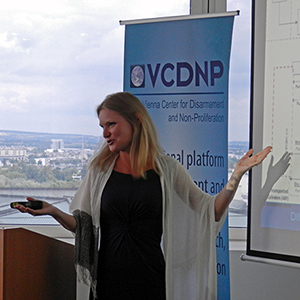

On 24 June 2015, Cindy Vestergaard, a senior researcher at the Danish Institute for International Studies (DIIS), presented the recent findings of the “Governing Uranium” project, a global research effort to study how a changing global market is impacting the governance of uranium production and trade. Led by DIIS, up to twenty-five researchers from ten partner and supporting institutes participated. The project studied fifteen uranium producing and consuming countries, representing 85 percent of global uranium production and 70 percent of consumption. These findings were published in the June 2015 DIIS Policy Brief entitled “Governing Uranium Globally: A Shifting Market Means New Demands for Uranium Security.”
According to Vestergaard, recent shifts in the global uranium market introduced new challenges for export controls, physical protection, tracking, and trade in natural uranium. In addition, technological advances in uranium processing have led to the production of a purer product, prompting the International Atomic Energy Agency (IAEA) to clarify where in the nuclear fuel cycle material accountancy begins.
After outlining the need to improve front-end uranium control and accountability, Vestergaard presented a number of recommendations on how to accomplish this:
Paragraph 34(c) of INFCIRC/153, the IAEA document which forms the basis for all comprehensive safeguards agreements (CSAs) with non-nuclear-weapon states, provides that any nuclear material of a composition and purity suitable for fuel fabrication or isotopic enrichment is subject to all of the safeguards procedures of a CSA, including nuclear material accountancy measures. This material is, accordingly, commonly referred to as “34(c) material.”
Vestergaard described the IAEA’s 2003 internal Policy Paper 18 (PP18), which clarifies what constituted 34(c) material in the context of conversion facilities. Ten years later, the IAEA developed further internal clarification in Policy Paper 21 (PP21). Access to such clarifications would assist state regulatory authorities industry and facility operators in understanding and complying with their safeguards obligations. She recommended that the clarifications set out PP18 and PP21 be made publicly available.
Vestergaard highlighted the benefits for companies that digitize their nuclear material databases and their nuclear material tracking methods. She argued that “establishing integrated digital inventory control systems will provide the IAEA with near real-time accountancy data.” Similarly, implementing digital tracking systems would alleviate the backlog and inventory challenges at conversion plants.
Vestergaard also recommended increased global cooperation and coordination between industry, states and the IAEA to further ensure a comprehensive approach to uranium security. She recommended further that states conclude bilateral nuclear cooperation agreements to provide additional treaty-based assurances for the peaceful uses of uranium. These state-to-state agreements should allow for bilateral reporting mechanisms, information sharing and prior consent for transferring, enriching or reprocessing material.
Vestergaard concluded that “companies along the nuclear supply chain can strengthen the global nuclear regulatory regime through engagement, material stewardship, and traceability approaches.” She illustrated that, in order for non-proliferation to be “a fully effective tenant of corporate sustainability, [industry] needed … committed companies, standards-based performance indicators, and knowledgeable investors and consumers.”

By continuing to use the site, you agree to the use of cookies. more information
The cookie settings on this website are set to "allow cookies" to give you the best browsing experience possible. If you continue to use this website without changing your cookie settings or you click "Accept" below then you are consenting to this.